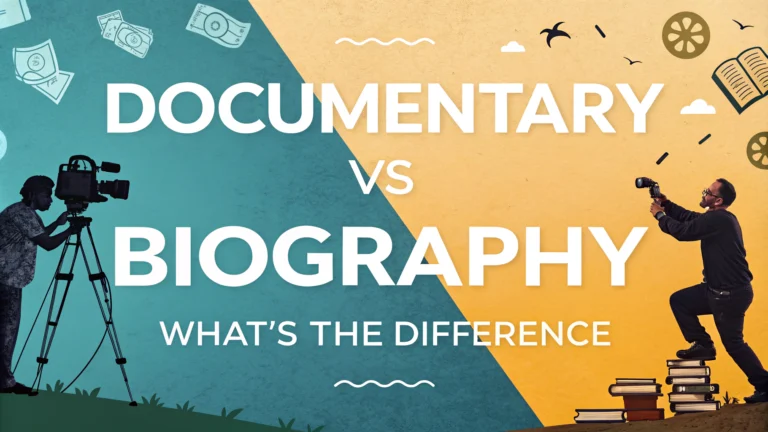Documentaries and biographies shape how we learn about people, events, and history. Both formats tell true stories, but they use different approaches and techniques to engage their audiences. The key differences between these storytelling methods help creators and viewers choose the right format for their needs.
While documentaries often tackle broader themes through visual storytelling and real-time footage, biographies focus on detailed written accounts of individual lives. Their distinct characteristics make each format uniquely suited for different types of narratives and audience expectations.
Key Elements of a Documentary
A documentary presents factual information through:
- **Visual Evidence**: Raw footage, interviews, and archival materials
- **Multiple Perspectives**: Various viewpoints from different sources
- **Real-time Documentation**: Events captured as they unfold
- **Narrative Structure**: Creative arrangement of facts and footage
Essential Components of a Biography
Biographies contain these core elements:
- **Chronological Flow**: Life events from birth to present/death
- **Personal Details**: Family background, relationships, and character development
- **Historical Context**: The era and society that shaped the subject
- **Source Material**: Letters, diaries, interviews, and official records
Format Comparison and Selection
| Documentary | Biography |
|---|---|
| Visual-first approach | Text-based narrative |
| Shorter timeframe coverage | Complete life story |
| Multiple subjects possible | Single subject focus |
| Immediate impact through visuals | Detailed analysis through text |
Choosing Between Documentaries and Biographies
Both documentaries and biographies tell true stories through different lenses. This guide outlines the unique strengths of each format and helps you pick the best approach for your storytelling needs.
Research Methods and Source Material
Documentary research involves:
– Live interviews and on-location filming
– Historical footage and photographs
– News archives and media records
– Expert testimonials
Biography research requires:
– Personal documents and letters
– Family records and interviews
– Official documents and records
– Published works by or about the subject
Technical Requirements and Production Skills
**Documentary production needs:**
– Video and sound equipment expertise
– Interview conducting skills
– Video editing capabilities
– Location scouting experience
**Biography writing demands:**
– Strong narrative writing skills
– Research methodology knowledge
– Fact-checking abilities
– Clear organizational structure
Budget and Resource Planning
| Documentary Costs | Biography Expenses |
|---|---|
| Equipment rental | Research travel |
| Film crew | Archive access |
| Post-production | Editing services |
| Music licensing | Publishing costs |
Distribution and Marketing Strategies
**Documentary platforms:**
– Streaming services
– Film festivals
– Educational institutions
– Broadcast television
**Biography channels:**
– Print publishers
– E-book platforms
– Audiobook services
– Academic libraries
Legal and Ethical Considerations
Essential guidelines:
– Obtain proper permissions and releases
– Verify facts from multiple sources
– Respect privacy boundaries
– Follow copyright laws
– Maintain objectivity
Impact Assessment and Success Metrics
Measure success through:
– Audience reach and engagement
– Critical reviews
– Sales or viewing figures
– Educational adoption
– Industry recognition
Making Your Final Decision
Consider these factors:
– Available resources and skills
– Target audience preferences
– Story complexity
– Time constraints
– Budget limitations
Match your format choice to your goals, abilities, and available resources. Focus on what serves your story best and aligns with your audience’s needs.
FAQs About Documentaries vs Biographies
Basic Differences
Q: What is the main difference between a documentary and a biography?
A: A documentary is a non-fiction film or program presenting facts and real events, while a biography is a detailed written account of someone’s life story.
Q: Can a documentary be a biography?
A: Yes, a documentary can be biographical (called a biographical documentary), but not all documentaries are biographies, and not all biographies are documentaries.
Format and Style
Q: What storytelling techniques do documentaries use vs biographies?
A: Documentaries typically use:
- Film footage
- Interviews
- Voice-overs
- Real-time events
While biographies use:
- Written narrative
- Historical research
- Personal accounts
- Chronological storytelling
Q: How long does a documentary vs biography take to create?
A: Documentaries typically take 1-3 years to produce, while biographies can take 2-5 years of research and writing.
Long-tail Keyword FAQs
Q: Which is better for learning about historical figures – documentary or biography?
A: Biographies generally provide more detailed historical context and personal information, while documentaries offer visual elements and contemporary perspectives.
Q: How much does it cost to make a biographical documentary?
A: Professional biographical documentaries typically cost between $100,000 to $2 million, depending on production quality, length, and research requirements.
Q: Are Netflix biographical documentaries considered documentaries or biographies?
A: They are considered documentary films with biographical content, combining elements of both formats.
Q: What makes a good biographical documentary vs written biography?
A: A good biographical documentary needs:
- Compelling visual content
- First-hand interviews
- Historical footage
A good written biography needs:
- Extensive research
- Multiple sources
- Detailed context
- Chronological coherence
Q: Which format is more accurate – documentary or biography?
A: Both can be equally accurate when properly researched. Biographies often contain more detailed factual information, while documentaries provide visual evidence and contemporary testimonies.
| Feature | Documentary | Biography |
|---|---|---|
| Format | Visual/Audio | Written |
| Length | 1-3 hours | 200-400 pages |
| Primary Sources | Interviews, footage | Documents, letters |



















